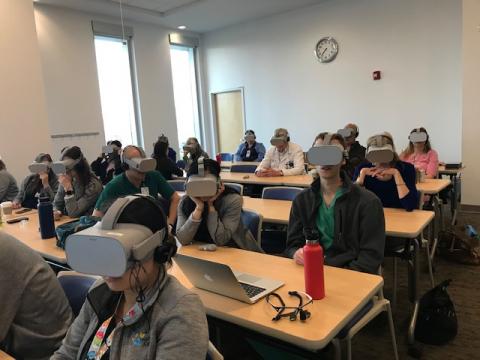
Six Ohio medical schools were awarded over $5.5 million to develop virtual reality (VR) trainings to educate Medicaid health care providers on barriers people experience when accessing health care.
The Medicaid Equity Simulation Project, funded by the Ohio Department of Medicaid’s Medicaid Technical Assistance and Policy Program (MEDTAPP), aims to reduce health disparities by improving cultural competency and reducing implicit bias among Medicaid health care providers. The Ohio Colleges of Medicine Government Resource Center administers the project, led by co-principal investigators Heather Robinson and Cara Whalen Smith and project manager Kaylene Way Hedgepeth.
Health care providers participating in the VR trainings will better understand the social determinants of health that impact a person’s health or ability to receive health care through immersive and interactive simulations. The six selected schools are currently developing their own patient simulation experiences:
Case Western Reserve University
- Neighborhood immersion: A 360-degree video of an individual in a distressed neighborhood managing chronic illness in light of challenges related to social determinants of health such as poor housing, lack of transportation, food insecurity, lack of access to healthy food, poverty, violence, and racism.
- Poverty simulation: A web app where the user clicks through a series of difficult choices that underscore the challenges of living in poverty. Participants will also experience a 360-degree video of managing the day to day challenges of living in poverty.
The Ohio State University
- Building empathy for dementia patients: Participants experience the daily struggles of a person with dementia as a live actor-driven caregiver avatar asks them to complete simple tasks.
- Taking a medical history from a patient with limited English proficiency: Participants will conduct a health care visit with an artificially intelligent virtual patient for whom English is not their first language.
- Access to dental care for immigrant families: A mobile-based VR app simulating the challenges of a non-English speaking mother trying to obtain dental care for her child.
- Virtual and Augmented Reality Implicit Association Training (VARIAT): An augmented reality-based interactive role-playing mobile app in which users will encounter a series of six scenarios related to implicit biases towards sexual orientation, ethnic minority, or socio-economic status.
Ohio University
- Social determinants of health in diabetes and opioid use: A 360-degree video simulating the experience of two people and the barriers they face in their everyday life, such as transportation, food insecurity, unstable home life, finances, safety, and patient-provider communication.
University of Cincinnati
- Promoting culturally sensitive care among Medicaid providers: Participants will experience the daily challenges faced by a person with limited English proficiency leading to a missed appointment and a person with schizophrenia who arrives late to an appointment.
University of Toledo
- Homeless shelter simulation: Interactive scenarios of a new intern working at an urban homeless shelter and the challenges impacting health care access and compliance for those experiencing homelessness.
Wright State University
- Digital Life Course game: Participants follow the life journey of two people - a pregnant woman with a history of opioid use disorder and an immigrant/refugee with limited English proficiency – through childhood, adolescence, and early adulthood. Game participants also complete a health care appointment at a community health center.
The VR trainings are expected to reach over 900 health care providers serving the Medicaid population by June 30, 2019.
